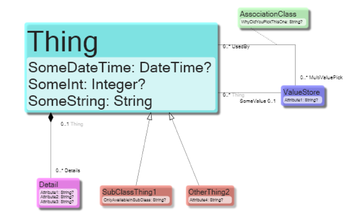OCLOperators allInstances
mNo edit summary |
(Replacing message template with parser tag) |
||
| (12 intermediate revisions by 5 users not shown) | |||
| Line 1: | Line 1: | ||
<message>Write the content here to display this box</message> | |||
=== allInstances () : Set{T} === | |||
Your model is central to all | Returns a Set containing all of the existing instances of the current classifier (along with instances of all its inherited classifiers). | ||
{| class="wikitable" | |||
!Expression | |||
!Result | |||
|- | |||
|let a : String = 'a', b : String = 'b', c : Integer = 2 in String.allInstances() | |||
|Set{'a','b'} | |||
|} | |||
Your model is central to all expressions you will handle. We will use this model for the examples: | |||
[[File:Allinstances operator.png|frameless|355x355px]] | [[File:Allinstances operator.png|frameless|355x355px]] | ||
| Line 9: | Line 17: | ||
|- | |- | ||
|'''Thing.allinstances''' | |'''Thing.allinstances''' | ||
|Gives you a list of all | |Gives you a list of all things | ||
|- | |- | ||
|'''Things.allinstances->select(someInt>3)''' | |'''Things.allinstances->select(someInt>3)''' | ||
| Line 21: | Line 29: | ||
|- | |- | ||
|'''Things.allinstances.Details''' | |'''Things.allinstances.Details''' | ||
|Gives a list of all | |Gives a list of all Detail objects that are connected to a Thing. The Detail objects that float around without a Thing will not be on the list | ||
|- | |- | ||
|'''Things.allinstances.Details.Attribute1''' | |'''Things.allinstances.Details.Attribute1''' | ||
|A list of nullable strings from the contents | |A list of nullable strings from the contents of the details attribute1. Note that OCL is null-tolerant – you do not need to check if the Details exist or not – the language handles null checks for you. | ||
|- | |- | ||
|'''SubClassThing1.allinstances.Details''' | |'''SubClassThing1.allinstances.Details''' | ||
| Line 32: | Line 40: | ||
|Filtering on Specialization is done with an operator SafeCast. This is null safe so for all objects that do not fit the profile the expression returns false | |Filtering on Specialization is done with an operator SafeCast. This is null safe so for all objects that do not fit the profile the expression returns false | ||
|} | |} | ||
To find all available you can open the OCL | This was a description of the <code>allinstances</code> operator. It is a common operator. To find all available operators, you can open the OCL Editor and type in a class. See: [[OCLOperators]] | ||
[[Category:OCL General Operators]] | |||
[[ | {{Edited|July|12|2024}} | ||
{| | |||
| | |||
|} | |||
Latest revision as of 07:49, 17 June 2024
allInstances () : Set{T}
Returns a Set containing all of the existing instances of the current classifier (along with instances of all its inherited classifiers).
| Expression | Result |
|---|---|
| let a : String = 'a', b : String = 'b', c : Integer = 2 in String.allInstances() | Set{'a','b'} |
Your model is central to all expressions you will handle. We will use this model for the examples:
| Operators | Description |
|---|---|
| Thing.allinstances | Gives you a list of all things |
| Things.allinstances->select(someInt>3) | Only things with someInt bigger than 3 |
| Thing.allinstances->select( (someInt>3) and (someInt<6)) | Only things with someInt bigger than 3 but less than 6. Notice the extra parenthesis to or the Boolean expressions together |
| Things.allinstances->select(x|x.someInt>3) | Here we introduce the loop variable x. We separate the definition of x from the usage of x with the pipe sign “|”. Loop variables are optional but if names are unique – but you will need to use them to give precision or to if you want to perform operations on the loop context itself. |
| Things.allinstances.Details | Gives a list of all Detail objects that are connected to a Thing. The Detail objects that float around without a Thing will not be on the list |
| Things.allinstances.Details.Attribute1 | A list of nullable strings from the contents of the details attribute1. Note that OCL is null-tolerant – you do not need to check if the Details exist or not – the language handles null checks for you. |
| SubClassThing1.allinstances.Details | Inherited features of classes are directly accessible |
| Thing.allInstances- >select(x|x.safeCast(SubClassThing1). OnlyAvailableInSubClass='Hello') | Filtering on Specialization is done with an operator SafeCast. This is null safe so for all objects that do not fit the profile the expression returns false |
This was a description of the allinstances operator. It is a common operator. To find all available operators, you can open the OCL Editor and type in a class. See: OCLOperators
This page was edited 94 days ago on 06/17/2024. What links here

